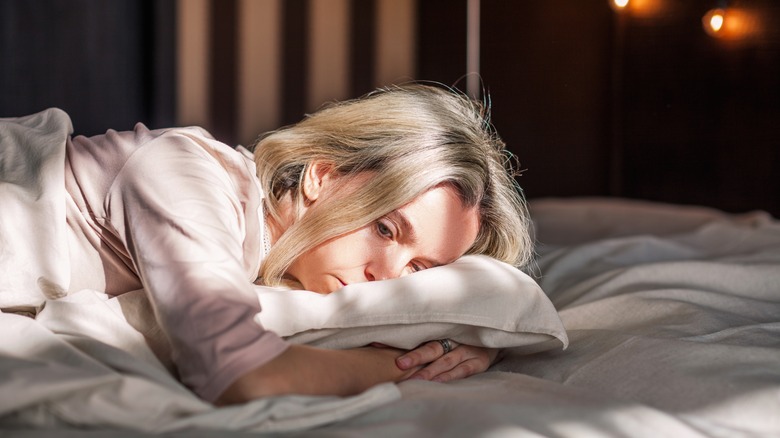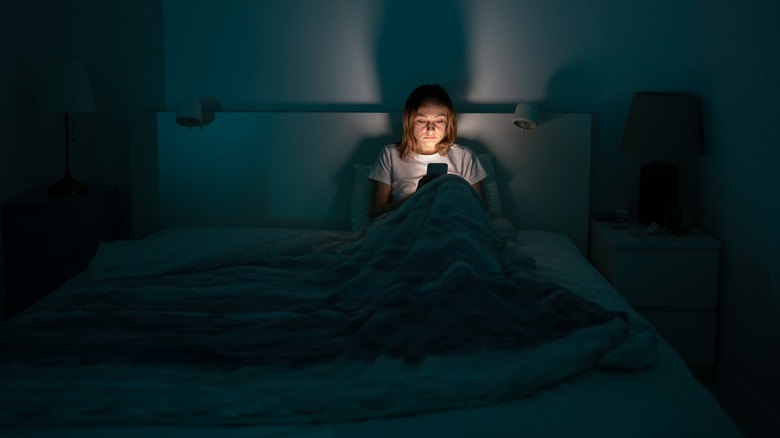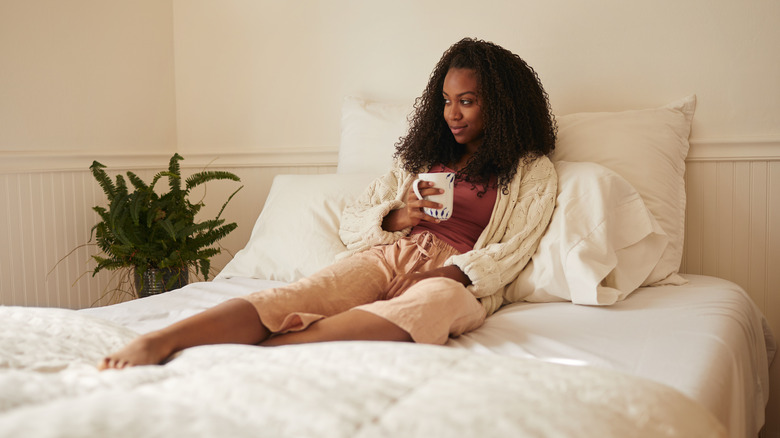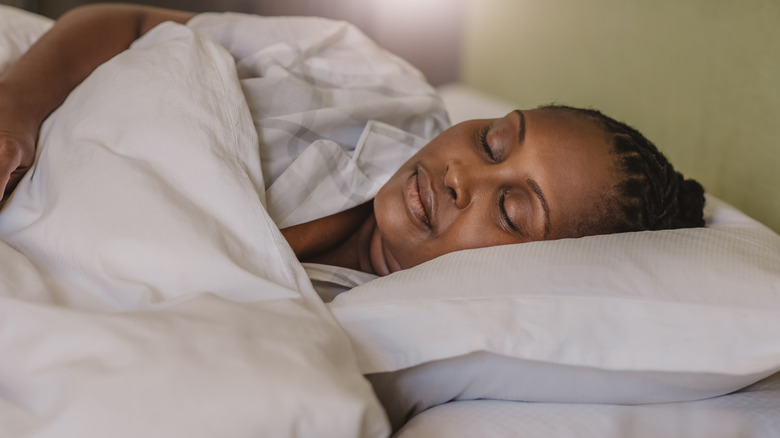Sneaky Reasons Why Your Bedtime Routine May Not Be Fostering Perfect Sleep
You may be familiar with the following scene: it's 2 AM, you have work in the morning, and your body isn't letting you fall asleep. Sleep is complex and fickle, whether you're adjusting to sharing a bed with a new partner or avoiding stimulating habits if you want a good night's sleep, but actually falling asleep is undoubtedly the hardest part. Believe it or not, there are a few reasons you may be getting poor sleep without realizing it.
According to pulmonologist Dr. Craig Canapari, allowing yourself time to fall asleep is essential. "It's totally normal to spend 30 minutes or more, falling asleep," he explained to Today. "So you actually have to let yourself have a little bit more of an opportunity to get enough sleep at night." That means starting your wind-down routine much earlier than you anticipate, especially if you're someone who requires a significant amount of time to fall asleep.
With that being said, there are a number of sneaky reasons why you may not be getting the sleep of your dreams — we're here to help.
Avoiding screen time in the bedroom
When it's time to unwind, your phone and laptop should stay back. According to the Sleep Foundation, our technological devices emit a blue light that affects the natural process of melatonin production. Our brain depends on our cognitive functions to naturally produce REM sleep, which means that using electronic devices at night can actually be detrimental to our health. As Dr. Canapari emphasized, the anxiety-inducing nature of social media can also affect how we sleep.
Social media is essentially "calibrated to give these really short bursts of media back to back and tend to be incredibly engaging and difficult to unplug from," he explained to Today. In many ways, we've already established that social media no longer serves us, but avoiding the apps specifically before bed can make a huge difference.
Don't work after office hours
One of the most important lessons you'll learn is drawing a line between your personal and professional life. That means logging off after office hours, not working overtime, and avoiding your professional life in your bedroom altogether. Trying to fuse work and relaxation will not only increase stress levels and affect your sleep, but will make you more susceptible to burnout, lower productivity, and health complications.
It can be hard to implement an effective work-life model into your own life, but the results are worth it. For example, communicate a boundary with your workplace and colleagues, explaining that you don't work after hours, will only respond to messages in the morning, and can't be reached once you leave the office (unless it's an emergency, of course). Establishing an unwavering boundary with your company — per their policies, expectations, hours, etc. — can help you transition into a more proper work-life balance.
Create a consistent nighttime routine
Since we're creatures of habit, creating an ideal nighttime routine can help you achieve optimal sleep. According to behavioral sleep medicine specialist Dr. Jade Wu, leaving some room to wind down is exactly what our body needs. "When you don't give your body and mind a chance to let go of the day's tension and stressors, you'll stay too wired to peacefully drift into sleep," she explained to Sleep.com. "It's essential to carve out that space in the evening, to create a bridge from wake to sleep."
There are several ways to unwind before bed, most of which depend on your interests, preferences, and what helps put you to sleep. For example, reading a book, meditation, yoga, drinking hot tea, taking a bath, and listening to music are all ways to prepare for bed without overstimulating the mind. Start by dimming the lights in your room, lighting a candle, journaling down immediate thoughts, and softly playing your favorite album. Don't be afraid to mix and match to your liking!
Opt for hot beverages over late night snacks
If you're a late-night snacker, we have bad news for you: it's affecting your sleep. Per Verywell Health, our body has its own process for breaking down and digesting food. When we snack at night, we put our bodies in late-night-digestion mode, the effects of which cause poor sleep and a lethargic feeling in the morning. Late-night snacking can cause nighttime heartburn, overeating, and negative overall health. Instead, allow 2-3 hours to pass before going to sleep after eating a meal.
If thirst or hunger calls for you in the night, try eating a small and nutritious snack (nuts, fruit, granola bar, etc.). On the other hand, you can fulfill your bedtime consumption by having hot tea or warm water before falling asleep. Warm beverages, especially those with natural antioxidants, can help promote sleep while bringing balance to your body's homeostasis.
Play pink, brown, or white noise
You've made it here — now it's time for bed. Before closing your eyes and dreaming away, play pink, brown, or white noise to help tune out any background noise and promote better sleep. While there are a few differences between white, pink, and brown noise, these static sounds can help mask distracting noises from outside your room or window. Depending on the color of your choice, set an hour-long timer to play a muffled frequency until you fall asleep.
Per WebMD, a recent study found that 38% of people fell asleep faster after playing white noise. These sounds can be found on YouTube, noise generator apps, and streaming platforms. Once you've chosen your preferred color noise, find a looping track to play overnight or until you fall asleep. Feel free to experiment with different sounds, colors, and time limits, and be sure to follow through with the routine consistently. Sleep tight!





